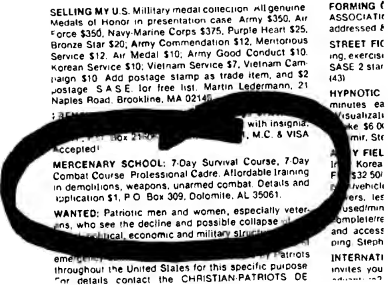Camper’s Training School and the FBI (By Ken Lawrence)
Foreword: This is from a text transcript of the article by Ken Lawrence on which Dave Emory and Nick Tuck based their radio show, found online under the title “Duke And Friends’ Involvement In Operation Red Dog / Bayou of Pigs”.
Source: Covert Action Information Bulletin, Number 16, March 1982, $2.50
Behind The Klan’s Karibbean
Koup Attempt
Part II
By Ken Lawrence
Camper’s Training School
and the FBI

In our first installment we showed that this advertisement from the March 1981 Soldier of Fortune recruited potential mercenaries for Franklin Joseph Camper’s training school. Camper was aware of the Dominica plot but declined to participate.
In July, Camper’s training school received considerable play in the press – feature stories with photographs in the Washington Star, the Christian Science Monitor, the Huntsvilte Times, and hundreds of other papers via Associated Press. Nearly all the free advertising for mercenary training in the U.S. was promoting Frank Camper, it seemed.
But two weeks after the publicity blitz began, the Birmingham News and the Tampa Tribune learned that Camper was an FBI informer when the Dade County prosecutor listed him as a key witness against his erstwhile partner, Robert Lisenby, on explosives and weapons charges in Miami.
Camper’s cover had been so effective that Lisenby’s father wrote to Soldier of Fortune following his son’s arrest to solicit information: “Why would anyone with Mr. Camper be arrested? He seems like a very fine young man and, according to my son Robert, is one of his best friends. Yet right now it seems like both face very stiff prison terms due to some informer. If anyone can shed any light on the matter, please write us.” (The same issue also ran a letter ridiculing Camper for the training exercise near a Florida nuclear power plant that got his entire “school” arrested for trespassing.)
Camper wasn’t happy that he had been exposed. “The reason I worked with the government is to help counter terrorism and I can’t do that if my identity is known.” He also feared that the unwanted publicity would hurt his mercenary school. “The Bureau has done me a great deal of harm.”
Once the truth was out, Camper admitted that his work for the FBI began years ago when he posed as a “disgruntled Vietnam vet” in order to spy on the Alabama Black Liberation Front and the Communist Party. ABLF activists contacted by CAIB had no recollection at all of Camper, but Jim Bains, now secretary of the Birmingham Peace Council, remembered him well:
“I don’t think he ever successfully infiltrated anything. As far as I know, everybody assumed he was a cop. He was such a classic. I vividly recall the first time he showed up – in his fatigues – at an anti-draft meeting at Birmingham Southern College in 1969 or 1970. He advocated bombs, blowing up draft boards, and things like that. Everyone thought either he was absolutely crazy or more likely a provocateur sent to destroy the anti-war movement.”
The April 1982 issue of Gung-Ho another mercenary magazine in which Camper advertises, contains a long article about his training school, complete with color photos. It not only makes no mention of Camper’s career as an informer, but actually implies the opposite, mentioning his two arrests in Florida and his connection with the Dominica coup plot. “1 knew he had been in and out of controversy – and jail – through confrontations with the law, especially the BATF,” wrote the author.
So it would seem that Camper has successfully restored his cover, placing him in an enviable position for a government agent. Many of the most serious potential mercenaries will be attracted to him. Those the government may find useful can be recruited for the usual dirty work, while those who support causes not approved by the U.S. can be found out and stopped.